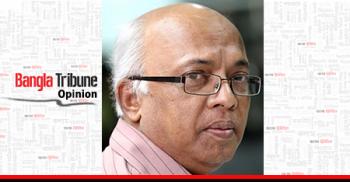 The authorities, as we understand it, have been going full steam into the business of nabbing the villains responsible for the murder of a young man in Barguna a few days ago. On the face of it, it is good news, given that the police have gone into action on the directive of the prime minister.
The authorities, as we understand it, have been going full steam into the business of nabbing the villains responsible for the murder of a young man in Barguna a few days ago. On the face of it, it is good news, given that the police have gone into action on the directive of the prime minister.
On a different and more worrying level, however, the reality of the prime minister wading into the scene and demanding action raises quite a few questions about the nature of governance in the country. If serious action on the issues that matter — and we speak of instances in the past as well — can only be taken on the directive of the prime minister, we can only conclude that her cabinet colleagues are either not powerful enough to take action on their own or are too dominated by the head of government to decide matters on their own.
In the Barguna case, the police ought to have stepped into the picture once the tragedy of the young man’s murder had come to pass. Orders should have gone out from the home ministry for swift action.
Why did the police and the home ministry wait for the prime minister to step into the picture? Indeed, why are the traditions generally upheld in a parliamentary form of government being upended in Bangladesh?
Reference can be made here to the instance of a woman lawmaker breaking into song in the Jatiya Sangsad last week. Parliament operates to conduct serious business of the state; it engages in debate and discussion on matters of public interest; it is a forum where elected representatives of the people raise the concerns of the people and have ministers respond to them in a satisfactory manner. When the lawmaker in question broke into song, the Speaker of the Jatiya Sangsad should have moved to remind her to speak on the subject before the House. The song trivialized the proceedings of the House.
Governance is serious business. It is the fulcrum which keeps the machinery of the State running. And it works through a clear delineation of the responsibilities to be carried out by those elected to govern. As a former diplomat noted last week on social media, in justifiably intense irritation, that when criminals play havoc with the law, when dark forces indulge in violations of the law abroad, the government does not wait for a president or a prime minister to issue directives on the action to be taken in order for the rule of law to prevail. It is for the interior ministers of countries abroad to exercise their constitutional responsibilities.
Ministers who swear by the constitution to do what they are required to do certainly do not wait for their leader, be it the prime minister or the president, to sanction action against those who have transgressed against the law and have therefore undermined the State. Their terms of reference are out there. But those terms of reference need to be followed through by definitive action. It is not enough, here in Bangladesh, for the home minister to inform the country, every time a crime occurs, that no offender will go scot-free. But, of course, offenders have by and large gone scot-free. The law will take its own course, our wise men in the corridors of power would have us know. The truth is that the law does not take its own course. It is thwarted somewhere along the way.
Politics is a complex affair, a truth which needs to register in those who wield the powers of the State. Those elected to office must be expansive in their approach to those who sit in opposition. That is why the government in office today must refrain from commenting on the internal affairs of the opposition.
The business of government in Bangladesh in these parlous times for the economy must be to devise the ways and means by which bank loan defaulters can be brought to justice. It should be to identify, without fear or favour, those who have been laundering money abroad, and apply the law on them in the harshest way possible.
Governance is certainly not about the minister placing blame for the sad condition of the railways on the Bangladesh Nationalist Party. Perhaps someone should remind him that the BNP was last in power thirteen years ago? Perhaps the prime minister should pull up such elements in her government in order to keep aloft the dignity of the government?
The prime minister, we have it from those who know or think they know, will go for a reshuffle of the cabinet soon. A reshuffle must be meaningful. It must entail ministers being moved from one department to another, the better to have them acquire and apply experience in the various regions of government. It must be a means of weeding out ministers who either do not perform or who embarrass the country in so many ways.
Meanwhile, let justice be done in the Barguna murder case. And will someone in authority begin talking about the Sagar-Runi murder, that terribly uncomfortable boil on our social body politic that is becoming increasingly putrid?
Syed Badrul Ahsan is a political commentator and biographer of Bangabandhu Sheikh Mujibur Rahman and Tajuddin Ahmad.
 Opinion
Opinion
30771 hour(s) 45 minute(s) ago ;
Evening 10:39 ; Saturday ; Apr 20, 2024
Governance is serious business
Send
Syed Badrul Ahsan
Published : 18:05, Jun 30, 2019 | Updated : 18:06, Jun 30, 2019
Published : 18:05, Jun 30, 2019 | Updated : 18:06, Jun 30, 2019
0 ...0 ...
/hb/
Topics: Syed Badrul Ahsan
***The opinions, beliefs and viewpoints expressed in this article are those of the author and do not reflect the opinions and views of Bangla Tribune.
- KOICA donates medical supplies to BSMMU
- 5 more flights to take back British nationals to London
- Covid19: Rajarbagh, Mohammadpur worst affected
- Momen joins UN solidarity song over COVID-19 combat
- Covid-19: OIC to hold special meeting
- WFP begins food distribution in Cox’s Bazar
- WFP begins food distribution in Cox’s Bazar
- 290 return home to Australia
- Third charter flight for US citizens to return home
- Dhaka proposes to postpone D8 Summit
Unauthorized use of news, image, information, etc published by Bangla Tribune is punishable by copyright law. Appropriate legal steps will be taken by the management against any person or body that infringes those laws.
Bangla Tribune is one of the most revered online newspapers in Bangladesh, due to its reputation of neutral coverage and incisive analysis.
F R Tower, 8/C Panthapath, Shukrabad, Dhaka-1207 | Phone: 58151324; 58151326, Fax: 58151329 | Mob: 01730794527, 01730794528


